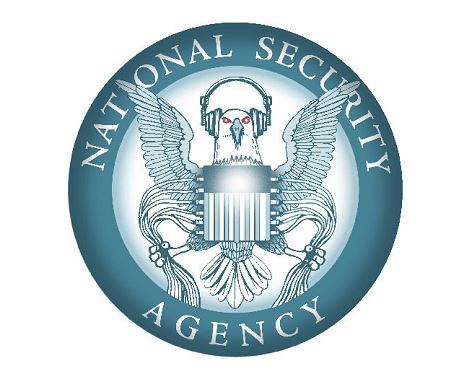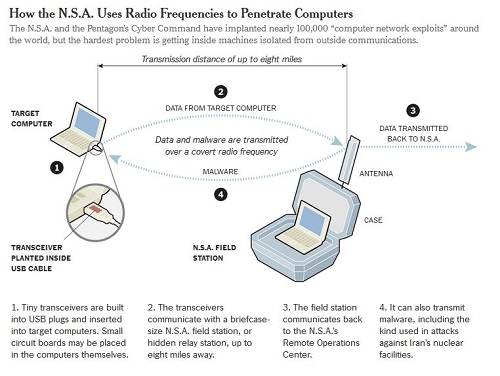The U.S.’s National Security Agency is no stranger to advanced cyber espionage tactics, having expanded its web of influence simultaneous to the internet's growth. The organization has been mapping the internet’s geography since web’s inauguration, giving the U.S. a head start in the spy-games waged between foreign networks. What Edward Snowden’s leaks have also taught us is that the NSA doesn’t even require Internet access to tap into these computers. It can use radio waves.

Image courtesy of Gizmodo
The technology has been in use since 2008 and relies on a covert channel of radio waves to access the computer. Gaining this type of access still requires a spy or unknowing conspirator, such as a manufacturer, to physically insert contaminated hardware, whether a circuit component or USB, that infects the targeted computer. Other scarier methods of admission involve using a brief-case sized relay station dropped off at a secret location within a few miles of the target.
NSA claims the technology, dubbed Quantum, has exclusively been used on to spy on Chinese and Russian military hacker groups, Mexican cartels, suspected terrorists, European “trade institutions,” and websites dedicated to “computer network exploitation,” in other words, potential threats. Under the euphemism of “active defense,” NSA’s Quantum program aims to thwarting foreign cyber-attacks, rather than initiating them.

Image courtesy of NY Times
Critics are quick to draw a parallel with the similar acts undertaken by foreign Chinese attackers, who inserted covert software for the purpose of spying on US government agencies and big business. The NSA denounces this statement; agency spokeswoman Vanee Vine tells the NY Times that “activities are focused and specifically deployed against — and only against — valid foreign intelligence targets in response to intelligence requirements.” No evidence exists to suggest domestic use.
Public outcry has had an effect in government policy, causing President Obama to hold a press conference on Friday 1/17/14, announcing some upcoming changes in practice being adopted by the NSA based on suggestions made by Silicon Valley and other experts. Silicon Valley has been especially critical of the NSA, recommending that the practice of exploiting software to aid in American surveillance and cyberattacks be banned, except in dire cases, as this lessens the international trustworthiness of US tech exports.
An anonymous U.S. senior official speaking with the NY Times likens web surveillance to submarine surveillance. He says that submarines are in place to track adversary submarines (who do the same thing), just like how cyber space surveillance “silently track the adversaries while they’re trying to silently track you.” The surveillance practices are an early warning system to national security, nothing more.
The irony of whole situation is the NSA’s reliance on technology dating back to an earlier century, that’s been repurposed for contemporary use.
Via NY Times
Advertisement
Learn more about Electronic Products Magazine





